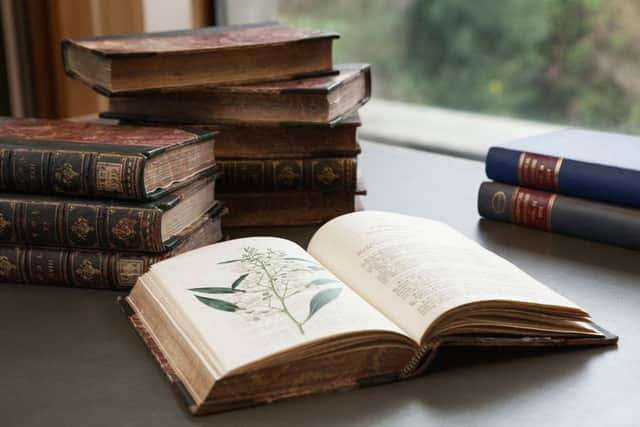Libraries are not to be written off just yet


IN THIS digital era where it is the norm for even the most bookish among us to consult Google on every subject from astronomy to zoology it can be easy to assume that all relevant information on those subjects is at our fingertips. But, is that really the case?
As a scientific research institute that also happens to be one of the country’s most popular visitor attractions, it is fair to say the Royal Botanic Garden Edinburgh (RBGE) is probably not best known as a public library. Yet, alongside the three million plus plant specimens housed in the large white Herbarium building is Scotland’s national collection of botanical and horticultural literature.
Advertisement
Hide AdAdvertisement
Hide AdWith around 70,000 books, more than 4,000 journals and large collections of original artworks, manuscripts and RBGE Archive, the Library is one of the most significant of its kind in Europe. What’s more, in addition to supporting the scientific and horticultural work carried out at the garden, it is open to the general public for reference purposes.
It is very much a living library and one key project is a joint initiative with the Centre for Research Collections (CRC) at the University of Edinburgh to catalogue the RBGE Rare Book Collection – approximately 4,000 published books, the earliest of which dates back to the 15th century. The aim is to create a detailed catalogue of records for every item in the collection including information on their provenance, bindings and any other unique features, such as hand-coloured illustrations.
But, in the current economic climate, where public sector budgets continue to face serious financial pressures, questions might be asked as to why we’re spending scarce resources listing a collection of, let’s face it, old books? Surely in this digital age we can just Google whatever we need? The simple response is, actually, no we can’t.
This isn’t a criticism of Google or any other search tool. Neither is it an anti-technology stance from a book-loving librarian: been there, done that but got over it! I’m now more than happy to admit to using Wikipedia on a regular basis and am a confirmed Twitter addict. The simple fact is that if you search for something on the internet you’ll only be able to find it if it has an online presence, ie if it’s on the internet, and therein lies the problem.
The Making Archival and Special Collections more accessible report, published by Online Computer Library Center (OCLC) has noted “much rare and unique material remains undiscoverable” and “Half of archival collections have no online presence”.
From a purely UK point of view the 2012 Hidden Collections report by Research Libraries UK (RLUK) found “Hidden collections remain an immense problem for UK libraries. Over 13 million volumes are uncatalogued in the libraries that responded, 18.5 per cent of the total number of volumes held by those libraries.”
Basically, we’re in a situation where huge amounts of rare and/or unique source material for research across scientific, social and cultural fields can’t be found by researchers in these fields. For example, within the RBGE collection we have letters from Charles Darwin, books owned by a former British prime minister and early photographs of rural China. None of these have been catalogued and so you just have to know they are there. And, we are probably not the first place political historians or anthropologists would come looking.
While it’s difficult to put an economic value on all this, an independent study, published in 2013, found that for every £1 of public funding the British library received in 2011-12 it generated £4.90 for the UK economy.
Advertisement
Hide AdAdvertisement
Hide AdJust think what could be generated if all of the really good stuff in all the UK collections was available to anyone who needed it?
The economics are important as funding for cataloguing projects is becoming increasingly difficult to come by. We were fortunate in being able to obtain a small pot of internal funding and support from the CRC for our Rare Book cataloguing project but the cataloguing of the unique materials in the RBGE Archive and the Illustrations Collection is currently reliant on our wonderful volunteers. As a result of their efforts we’ve been able to make finding aids for some of our art collections available via the website. An online catalogue of the Archive collections will go live later this year. That’s a start but wouldn’t it be nice if all of the collections that are currently hidden away in Scotland’s libraries were discoverable?
• Lorna Mitchell is head of library services, the Royal Botanic Garden Edinburgh
SEE ALSO